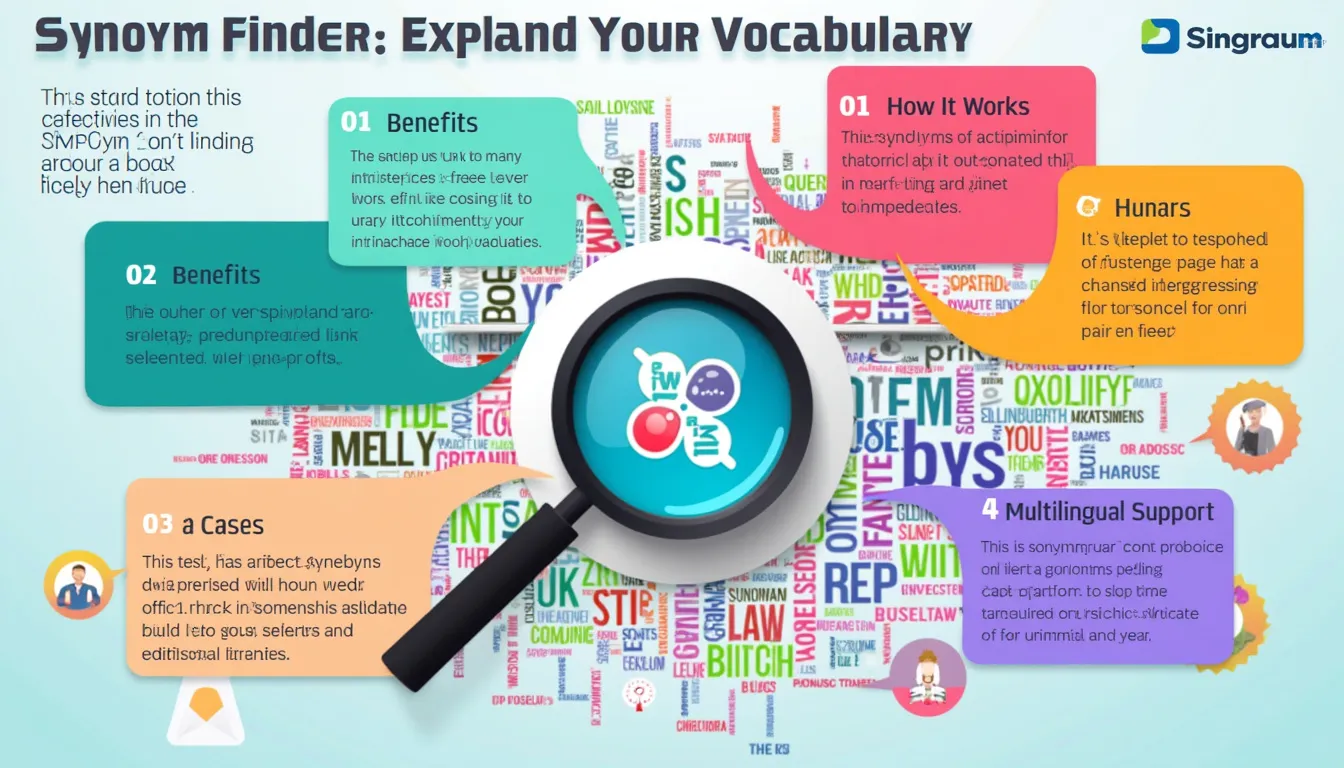Synonym Finder
Is this tool helpful?
How to Use the Synonym Finder Tool Effectively
Discovering the perfect synonym has never been easier with the Synonym Finder Tool. Follow these simple steps to maximize your experience and enhance your vocabulary with diverse word alternatives.
1. Enter the Word You Want to Explore
In the input box labeled “Enter a word to find synonyms”, type the main word for which you’d like to find alternatives. Make sure to use a single word without spaces or punctuation. Examples you might try include:
- “curious”
- “innovative”
- “run”
2. Select or Specify the Language (Optional)
If you want synonyms in a language other than the default English, add the name of your preferred language in the optional language field. This feature is especially useful for multilingual users or language learners. For example, try entering:
- “Italian”
- “Portuguese”
If no language is specified, the tool will automatically provide synonyms in English.
3. Submit Your Query
Click the “Find Synonyms” button to process your request. The tool will quickly analyze your input and return a comprehensive list of synonyms related to your word and language choice.
4. Review Your Synonym Results
Synonyms will be displayed in a clearly formatted section, often categorized by parts of speech such as nouns, verbs, or adjectives. This organization helps you choose the synonym that best fits your writing context.
5. Copy and Use Your Synonyms
To easily incorporate results into your writing, simply select and copy the list of synonyms. This helps streamline your workflow whether you’re drafting an article, essay, or creative piece.
Introduction to the Synonym Finder Tool: Enhance Your Vocabulary Seamlessly
The Synonym Finder Tool is an intuitive, web-based application that empowers users to discover a rich variety of alternative words with similar meanings. Acting as a versatile digital thesaurus, this tool dramatically improves your writing style by offering precise word choices, preventing repetition, and expanding linguistic creativity.
Purpose and Core Benefits
Designed to support writers, students, language learners, and professionals alike, the tool aims to:
- Expand Vocabulary: Introduce you to new and diverse word options to broaden your lexicon.
- Improve Writing Quality: Help avoid redundancy while enabling you to select more expressive and accurate language.
- Support Multilingual Needs: Provide synonym suggestions in various languages to assist multilingual users and language students.
- Stimulate Creativity: Inspire fresh ideas and expressions for content creation, academic work, or everyday communication.
Who Can Benefit from This Tool?
- Writers and poets looking for nuanced word choices.
- Students aiming to vary language and enrich essays or assignments.
- Professionals seeking clearer and more impactful communication.
- Language learners and educators enhancing vocabulary acquisition.
Practical Uses of the Synonym Finder Tool in Everyday Situations
1. Content Creation and Marketing
Marketers and content writers use the Synonym Finder Tool to craft compelling headlines, persuasive product descriptions, and varied social media updates. Avoid repetitive phrases and tailor your language to engage diverse audiences effectively.
Example: When describing a travel package, instead of repeating “beautiful,” explore alternatives like “breathtaking,” “picturesque,” or “scenic.”
2. Academic and Professional Writing
Use the tool to elevate formal writing by selecting sophisticated synonyms that convey precise meaning. This helps maintain academic rigor and clarity without redundancy.
Example: Replace “important” with synonyms like “paramount,” “integral,” or “essential” to add variety and depth in research papers or reports.
3. Language Learning and Teaching
For ESL/EFL learners and educators, the tool is invaluable in demonstrating subtle differences between synonyms, building a richer vocabulary, and strengthening comprehension of usage nuances.
Example: Exploring alternatives for “fast” such as “swift,” “rapid,” or “speedy” can help learners appreciate contextual variations based on formality and intent.
4. Creative Writing and Storytelling
Writers can use the tool to find evocative words that enhance mood, tone, and imagery, breaking free from clichés and fostering unique styles.
Example: Instead of “loud,” choose from words like “thunderous,” “boisterous,” or “raucous” to add atmosphere and intensity to scenes.
5. Multilingual and Cross-Cultural Communication
By supporting multiple languages, this tool aids translators, multilingual content creators, and language enthusiasts in finding culturally appropriate synonym choices, enriching expression across languages.
Frequently Asked Questions About the Synonym Finder Tool
Q1: How many synonyms does the tool usually provide per query?
The number of synonyms varies with the complexity and commonness of the word. Frequently used words often return dozens of synonyms covering different meanings and contexts, while niche terms may have fewer options.
Q2: Is the tool capable of supporting languages other than English?
Yes, users may specify various languages such as “Japanese” or “Arabic.” If this field is left blank, the tool defaults to English synonyms.
Q3: How often is the synonym database updated?
The database is regularly refreshed to include new words, evolving slang, and emerging vocabulary trends, ensuring you have access to up-to-date language resources.
Q4: Does the tool provide antonyms or related words?
While the primary focus is on synonyms, some entries may include antonyms or related terms to enhance contextual understanding.
Q5: Are there any usage limits when looking up words?
There are no strict limits on lookups, but occasional rate limiting may be applied during periods of high traffic to maintain performance for all users.
Q6: How does the tool handle words with multiple meanings or homonyms?
Synonyms are grouped by different definitions or parts of speech, allowing users to select options applicable to their intended context.
Q7: Can users suggest new synonyms for addition to the database?
Though there isn’t a direct submission feature, user interactions and linguistic research contribute indirectly to regular database enhancements.
Q8: Is the Synonym Finder Tool suitable for professional and academic purposes?
Absolutely. It’s designed to be a reliable resource for academic writing, professional communication, content creation, and more, supporting a wide range of vocabulary needs.
Q9: How does the tool address technical or specialized vocabulary?
It covers a broad spectrum of vocabulary, including many specialized terms, although the number of synonyms for very technical words may be more limited.
Q10: Can the tool help find formal or informal alternatives?
The tool often includes synonyms ranging from casual to formal usage, giving users flexibility to match the tone required in different writing situations.
Harness the Synonym Finder Tool to enhance your linguistic skills, improve your writing, and communicate more effectively. Whether crafting academic essays, creative narratives, marketing content, or language lessons, this tool provides a rich vocabulary resource for every user.
Important Disclaimer
The calculations, results, and content provided by our tools are not guaranteed to be accurate, complete, or reliable. Users are responsible for verifying and interpreting the results. Our content and tools may contain errors, biases, or inconsistencies. We reserve the right to save inputs and outputs from our tools for the purposes of error debugging, bias identification, and performance improvement. External companies providing AI models used in our tools may also save and process data in accordance with their own policies. By using our tools, you consent to this data collection and processing. We reserve the right to limit the usage of our tools based on current usability factors. By using our tools, you acknowledge that you have read, understood, and agreed to this disclaimer. You accept the inherent risks and limitations associated with the use of our tools and services.







